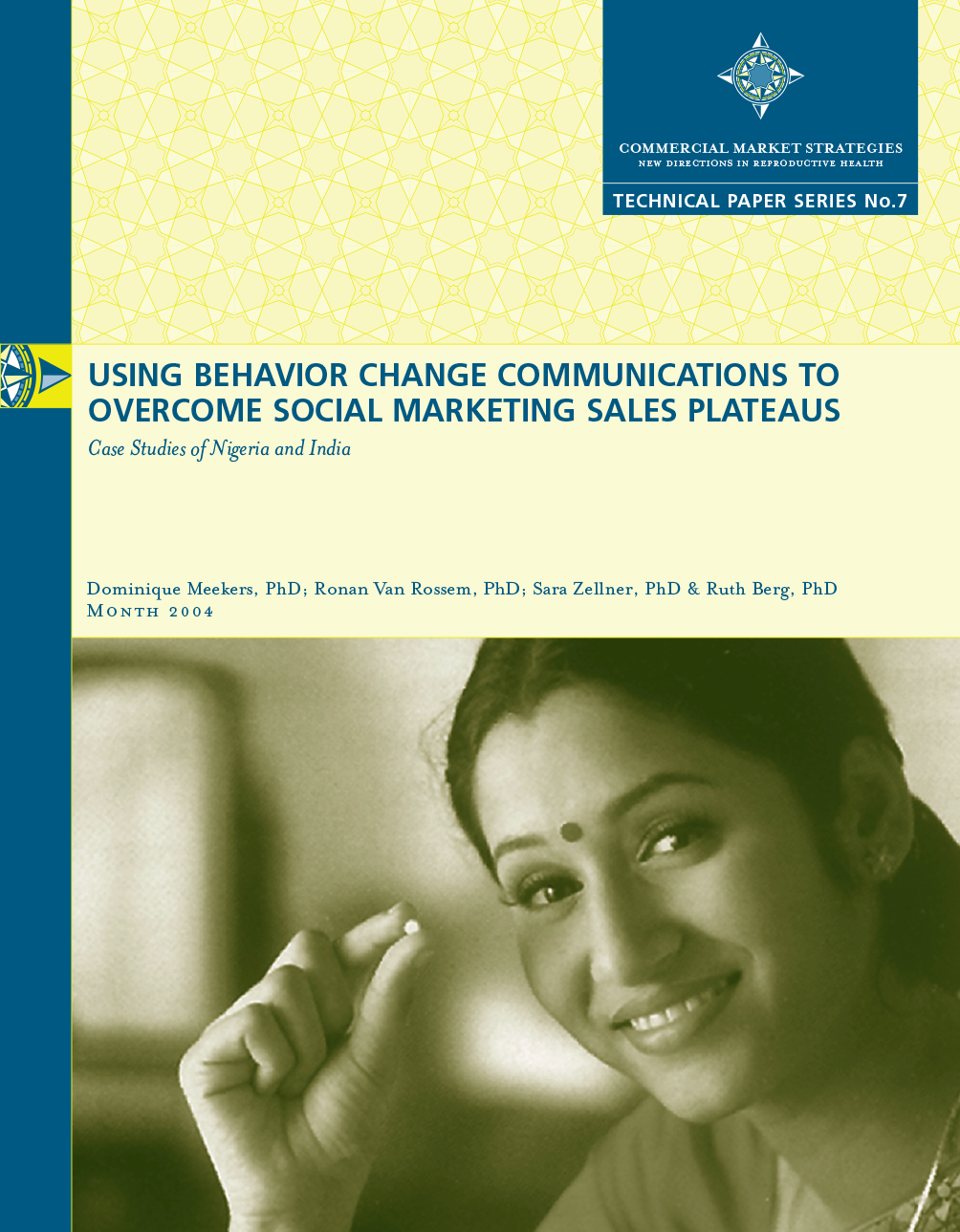
Resource Library
Using Behavior Change Communications To Overcome Social Marketing Sales Plateaus: Case Studies of Nigeria and India
In an effort to improve social marketing programming knowledge about the extent to which behavior change interventions can bolster social marketing sales, this report presents case studies of two social marketing programs: the Society for Family Health's condom program in Nigeria and the Commercial Market Strategies project's oral contraceptive program in India. Both programs recently adopted behavior change strategies to counter stagnating reproductive health product sales, and both collected multiple rounds of household survey data to closely monitor program outcomes. The analysis reveals that both social marketing sales and method prevalence increased significantly following the behavior change campaigns in the two countries. However, a substantial time lag of up to two years transpired before measurable change occurred in some indicators of knowledge and attitudes related to method use. These findings suggest that behavior change communications can help revive social marketing sales in mature social marketing programs. Given time, this approach appears to be effective at improving knowledge and attitudes related to reproductive health methods, which, in turn, may contribute to further increases in method prevalence in the long run.
Resource Type : Other
Country : India, Nigeria
Year : 2004-01-01T17:00:00
Language : English
Project : SHOPS

Resource Library
The Commercial Market Strategies Final Report
The Commercial Market Strategies (CMS) project was the flagship private-sector project of USAID's Office of Population and Reproductive Health (G/PRH). CMS was designed to increase the use of family planning and other health products and services through the private sector. From 1998 to 2004, CMS worked in 29 countries to develop and implement a wide range of country programs, technical assistance projects, new initiatives, and global research — all with the aim of expanding access of family planning products and services through commercial approaches and private-sector partnerships. The CMS Final Report provides a comprehensive examination of the technical strategies, accomplishments, results, and lessons learned from the project's programs and activities. A major finding is that commercial organizations are a key resource for donors and development projects in accomplishing health sector objectives, particularly for family planning and reproductive health care. CMS programs involved partnerships with the private sector in a broad range of countries (including India, Morocco, Jordan, Senegal, Uganda, Ghana, Madagascar, Nepal, Nicaragua, and the Philippines), which resulted in improved access to, and quality of, family planning products and services. Through these programs, CMS provided consumers with valuable information about, and access to, essential health products, such as modern contraceptives, oral rehydration therapies, insecticide-treated malaria nets, treatment kits for sexually transmitted infections, and voluntary testing and counseling services for HIV/AIDS. This report also provides detailed information on the various technical strategies used by CMS, including social marketing, support for provider networks, health financing, sustainability for health care non-governmental organizations, corporate social responsibility, and policy.
Resource Type : Report
Country : Ghana, India, Jordan, Madagascar, Morocco, Nepal, Nicaragua, Philippines, Senegal, Uganda
Year : 2004-01-01T15:00:00
Language : English
Project : SHOPS

Resource Library
Privately Funded Quality Health Care in India: A Sustainable and Equitable Model
As the cost and degree of training necessary to provide state of the art health care has increased throughout the world, the present challenge in health care is to establish institutions that are financially sound and responsive to the dynamic needs of the communities in which they exist. As public funds have diminished, the role of the private sector in establishing innovative health care institutions has increased. This paper reviews the case of the LV Prasad Eye Institute (LVPEI), an ophthalmologic institute in Hyderabad, India, that is financially sound and medically vital. With an annual budget of US$3 million, 180,000 patients are seen and 23,000 surgeries are performed at the Institute and its satellites each year. The Institute provides patient care at a ratio of 1:1 non-paying to paying patients through fee cross- subsidization. The Institute uses a combination of financial modalities, including donations, grants and fees to administer its non-patient care programs. Non-clinical programs of the Institute include a paramedical training program and a fellowship in ophthalmology, an internationally accredited eye bank for the preservation of corneal tissues, a rural outreach and education program, a basic science and epidemiology program that directs health policy activities of the Institute and a rehabilitation program for patients with incurable visual deficits. To evaluate its effectiveness, LVPEI uses quality improvement measures, including patient surveys, post-operative outcomes studies and service utilization reviews. This case report of a privately- funded medical institution describes a successful model through which high-quality, equitable health care can be provided in a developing country. The LVPEI's active program of quality management, its academic commitment and programmatic relevance to the needs of its community should be modularized and replicated to establish equitable, efficient and effective health care institutions in the developing world.
Resource Type :
Country :
Year : 2001-01-01T15:30:00
Language :
Project : SHOPS
Pagination
- Previous page
- Page 17




